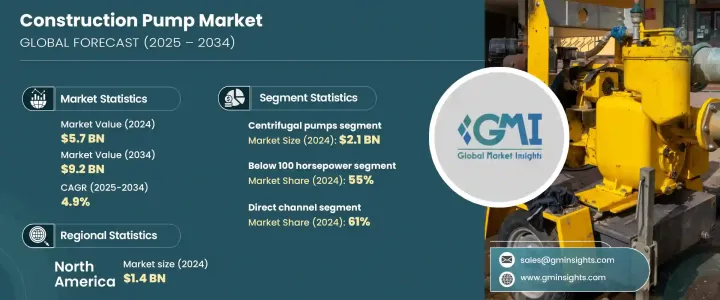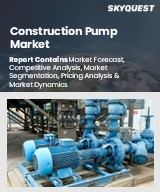
|
시장보고서
상품코드
1721586
건설용 펌프 시장 기회, 성장 촉진요인, 산업 동향 분석 및 예측(2025-2034년)Construction Pump Market Opportunity, Growth Drivers, Industry Trend Analysis, and Forecast 2025 - 2034 |
||||||
세계의 건설용 펌프 시장 규모는 2024년 57억 달러로 평가되었고, CAGR 4.9%를 나타내 2034년에는 92억 달러에 이를 것으로 예측되고 있습니다. 인구가 도시 중심부로 이동함에 따라 건설용 펌프를 포함한 견고한 건설 기계에 대한 수요가 높아지고 있습니다.

또한 자연재해의 빈도가 증가하고 효과적인 홍수 방지 메커니즘이 필요하다는 점도 건설용 펌프 수요를 높여주고 있습니다. 가 세계의 견인역이 되고 있기 때문에 건설용 펌프 시장은 안정된 수요가 전망됩니다. 또한, IoT 대응 펌프 감시 시스템이나 에너지 효율이 높은 펌프 솔루션등의 기술 혁신이 제조업체의 경쟁 우위성을 만들어내, 현대적인 건설 업무의 진화하는 요구에 대응하는데 도움이 되고 있습니다.
| 시장 범위 | |
|---|---|
| 시작 연도 | 2024년 |
| 예측 연도 | 2025-2034년 |
| 시작 금액 | 57억 달러 |
| 예측 금액 | 92억 달러 |
| CAGR | 4.9% |
원심 펌프 분야는 2024년에 시장을 독점하여 21억 달러의 수익을 올렸습니다. 물 기능을 수행하는 성능은 건설 전문가들에게 선호되는 옵션이 되고 있습니다.
동력 구분에서 시장은 100마력 미만, 100-500마력, 500마력 이상의 3개로 분류됩니다. 양 설계, 휴대성, 저렴한 가격이 인기의 이유입니다. 이 펌프는 기초 탈수, 지하수 처리, 콘크리트의 효율적인 이동에 매우 적합하며 비용과 기동성이 중요한 결정 요인이되는 신흥 시장에 필수적입니다.
미국의 건설용 펌프 시장은 78%의 점유율을 차지하고 2024년의 평가액은 14억 달러에 이르렀습니다. 한편, 캐나다 시장 전망은 엄격한 환경 규제에 의해 형성되어 배출량을 삭감하고 성능을 최적화하도록 설계된 에너지 효율적인 펌프 시스템의 채용이 가속화되고 있습니다.
세계의 건설용 펌프 산업의 주요 기업으로는 자일렘, 츠루미 제작소, SPX Flow, Weir Group, Sulzer, Seepex, Pentair, MDM, KSB SE, ITT, 그룬드 포스, 플로저브, 에바라 제작소, BJM Pumps, Atlas Copco 등이 있습니다. 업계 선두 각사는 진화하는 건설 요건에 대응하기 위해 내구성 향상, 에너지 소비 절감, 스마트 기능을 갖춘 차세대 펌프의 개발에 적극적으로 임하고 있습니다.
목차
제1장 조사 방법과 범위
제2장 주요 요약
제3장 업계 인사이트
- 생태계 분석
- 밸류체인에 영향을 주는 요인
- 이익률 분석
- 파괴적 혁신
- 향후 전망
- 제조업체
- 유통업체
- 공급자의 상황
- 기술적 상황
- 주요 뉴스와 대처
- 규제 상황
- 영향요인
- 성장 촉진요인
- 도시화와 인프라 개발
- 기술의 진보
- 건설 프로젝트에 대한 투자 증가
- 업계의 잠재적 위험 및 과제
- 높은 초기 비용
- 규제 및 환경 규정 준수
- 성장 촉진요인
- 성장 가능성 분석
- Porter's Five Forces 분석
- PESTEL 분석
제4장 경쟁 구도
- 서론
- 기업의 시장 점유율 분석
- 경쟁 포지셔닝 매트릭스
- 전략적 전망 매트릭스
제5장 시장 추계·예측 : 제품 유형별(2021-2034년)
- 주요 동향
- 원심 펌프
- 용적식 펌프
- 수중 펌프
- 진공 펌프
- 다이어프램 펌프
- 기타(기어 펌프, 제트 펌프 등)
제6장 시장 추계·예측 : 파워별(2021-2034년)
- 주요 동향
- 100HP 이하
- 100-500HP
- 500HP 이상
제7장 시장 추계·예측 : 용량별(2021-2034년)
- 주요 동향
- 1,000GPM 이하
- 1,000-2,000GPM
- 2,000-3,000GPM
- 3,000GPM 이상
제8장 시장 추계·예측 : 유통 채널별(2021-2034년)
- 주요 동향
- 직접
- 간접
제9장 시장 추계·예측 : 지역별(2021-2034년)
- 주요 동향
- 북미
- 미국
- 캐나다
- 유럽
- 영국
- 독일
- 프랑스
- 이탈리아
- 스페인
- 러시아
- 아시아태평양
- 중국
- 인도
- 일본
- 한국
- 호주
- 라틴아메리카
- 브라질
- 멕시코
- 중동 및 아프리카
- 아랍에미리트(UAE)
- 사우디아라비아
- 남아프리카
제10장 기업 프로파일
- Atlas Copco
- BJM pumps
- Ebara
- Flowserve
- Grundfos
- ITT
- KSB SE
- MDM
- Pentair
- Seepex
- SPX Flow
- Sulzer
- Tsurumi Manufacturing
- Weir Group
- Xylem
The Global Construction Pump Market was valued at USD 5.7 billion in 2024 and is estimated to grow at a CAGR of 4.9% to reach USD 9.2 billion by 2034. The upward trajectory of this market is largely propelled by rapid urbanization, escalating infrastructure investments, and the continued expansion of the construction sector across both developed and developing nations. As global populations migrate toward urban centers, the demand for robust construction machinery-including construction pumps-has intensified. These pumps play a vital role in ensuring operational efficiency at construction sites by supporting dewatering, slurry handling, and concrete transportation, among other critical tasks.

The increasing frequency of natural disasters and the need for effective flood control mechanisms have also bolstered the demand for construction pumps. Moreover, government-backed infrastructure development initiatives, particularly in Asia-Pacific and the Middle East, are generating new growth avenues for the industry. With smart cities and mega-urban projects gaining traction worldwide, the construction pump market is expected to witness consistent demand. Additionally, technological innovations such as IoT-enabled pump monitoring systems and energy-efficient pumping solutions are creating a competitive advantage for manufacturers, helping them cater to the evolving needs of modern construction operations.
| Market Scope | |
|---|---|
| Start Year | 2024 |
| Forecast Year | 2025-2034 |
| Start Value | $5.7 Billion |
| Forecast Value | $9.2 Billion |
| CAGR | 4.9% |
The centrifugal pumps segment dominated the market in 2024, generating USD 2.1 billion in revenue. This segment's stronghold stems from the pumps' superior capability to transport water and viscous liquids with efficiency. Their performance in managing thick sludge and executing dewatering functions makes them a preferred choice for construction professionals. Centrifugal pumps offer the ideal blend of power, reliability, and cost-effectiveness, which supports their widespread deployment across construction sites worldwide.
In terms of power segmentation, the market is classified into three categories: below 100 horsepower, 100 to 500 horsepower, and above 500 horsepower. In 2024, pumps below 100 horsepower accounted for 55% of the total market share. Their popularity lies in their lightweight design, portability, and affordability, particularly in regions where small and mid-scale construction projects are more prevalent. These pumps are highly suitable for dewatering foundations, handling groundwater, and moving concrete efficiently-making them indispensable for emerging markets where cost and mobility are key decision factors.
The U.S. Construction Pump Market held a commanding 78% share and reached a valuation of USD 1.4 billion in 2024. The country's consistent infrastructure expansion, ranging from housing developments to commercial and industrial complexes, continues to generate substantial demand for construction pumps. Canada's market outlook, on the other hand, is shaped by strict environmental regulations that have accelerated the adoption of energy-efficient pump systems designed to reduce emissions and optimize performance.
Key players in the Global Construction Pump Industry include Xylem, Tsurumi Manufacturing, SPX Flow, Weir Group, Sulzer, Seepex, Pentair, MDM, KSB SE, ITT, Grundfos, Flowserve, Ebara, BJM Pumps, and Atlas Copco. Industry leaders are actively developing next-gen pumps with enhanced durability, reduced energy consumption, and smart features to meet evolving construction requirements. Many companies are also prioritizing after-sales support and maintenance services to drive customer loyalty and long-term market presence.
Table of Contents
Chapter 1 Methodology & Scope
- 1.1 Market scope & definitions
- 1.2 Base estimates & calculations
- 1.3 Forecast calculations
- 1.4 Data sources
- 1.4.1 Primary
- 1.4.2 Secondary
- 1.4.2.1 Paid sources
- 1.4.2.2 Public sources
Chapter 2 Executive Summary
- 2.1 Industry synopsis, 2021-2034
Chapter 3 Industry Insights
- 3.1 Industry ecosystem analysis
- 3.1.1 Factor affecting the value chain
- 3.1.2 Profit margin analysis
- 3.1.3 Disruptions
- 3.1.4 Future outlook
- 3.1.5 Manufactures
- 3.1.6 Distributors
- 3.2 Supplier landscape
- 3.3 Technological landscape
- 3.4 Key news & initiatives
- 3.5 Regulatory landscape
- 3.6 Impact forces
- 3.6.1 Growth drivers
- 3.6.1.1 Urbanization and infrastructure development
- 3.6.1.2 Technological advancement
- 3.6.1.3 Increased investment in construction project
- 3.6.2 Industry pitfalls & challenges
- 3.6.2.1 High initial cost
- 3.6.2.2 Regulatory and environmental compliance
- 3.6.1 Growth drivers
- 3.7 Growth potential analysis
- 3.8 Porter’s analysis
- 3.9 PESTEL analysis
Chapter 4 Competitive Landscape, 2024
- 4.1 Introduction
- 4.2 Company market share analysis
- 4.3 Competitive positioning matrix
- 4.4 Strategic outlook matrix
Chapter 5 Market Estimates & Forecast, By Product Type, 2021-2034 (USD Billion) (Thousand Units)
- 5.1 Key trends
- 5.2 Centrifugal pumps
- 5.3 Positive displacement pumps
- 5.4 Submersible pumps
- 5.5 Vacuum pumps
- 5.6 Diaphragm pumps
- 5.7 Others (gear pumps, jet pumps, etc.)
Chapter 6 Market Estimates & Forecast, By Power, 2021-2034 (USD Billion) (Thousand Units)
- 6.1 Key trends
- 6.2 Below 100 HP
- 6.3 100 - 500 HP
- 6.4 Above 500 HP
Chapter 7 Market Estimates & Forecast, By Capacity, 2021-2034 (USD Billion) (Thousand Units)
- 7.1 Key trends
- 7.2 Below 1000 GPM
- 7.3 1000 to 2000 GPM
- 7.4 2000 to 3000 GPM
- 7.5 Above 3000 GPM
Chapter 8 Market Estimates & Forecast, By Distribution channel, 2021-2034 (USD Billion) (Thousand Units)
- 8.1 Key trends
- 8.2 Direct
- 8.3 Indirect
Chapter 9 Market Estimates & Forecast, By Region, 2021-2034 (USD Billion) (Thousand Units)
- 9.1 Key trends
- 9.2 North America
- 9.2.1 U.S.
- 9.2.2 Canada
- 9.3 Europe
- 9.3.1 UK
- 9.3.2 Germany
- 9.3.3 France
- 9.3.4 Italy
- 9.3.5 Spain
- 9.3.6 Russia
- 9.4 Asia Pacific
- 9.4.1 China
- 9.4.2 India
- 9.4.3 Japan
- 9.4.4 South Korea
- 9.4.5 Australia
- 9.5 Latin America
- 9.5.1 Brazil
- 9.5.2 Mexico
- 9.6 MEA
- 9.6.1 UAE
- 9.6.2 Saudi Arabia
- 9.6.3 South Africa
Chapter 10 Company Profiles
- 10.1 Atlas Copco
- 10.2 BJM pumps
- 10.3 Ebara
- 10.4 Flowserve
- 10.5 Grundfos
- 10.6 ITT
- 10.7 KSB SE
- 10.8 MDM
- 10.9 Pentair
- 10.10 Seepex
- 10.11 SPX Flow
- 10.12 Sulzer
- 10.13 Tsurumi Manufacturing
- 10.14 Weir Group
- 10.15 Xylem



















